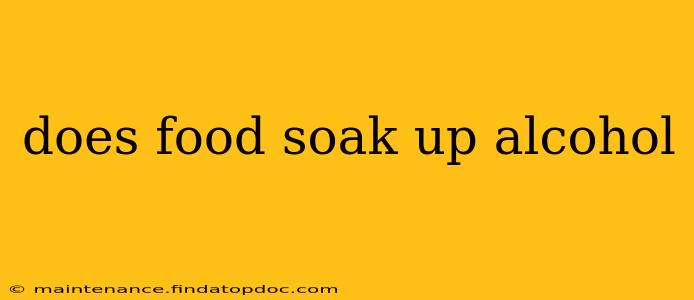The idea that food can "soak up" alcohol is a common misconception. While food can influence how your body processes alcohol, it doesn't absorb it in the way a sponge absorbs water. This article will delve into the science behind alcohol metabolism and explain the true relationship between food and alcohol consumption.
How Does the Body Process Alcohol?
Understanding how your body processes alcohol is key to understanding why the "soaking up" idea is inaccurate. Once consumed, alcohol is absorbed primarily in the small intestine and then quickly enters the bloodstream. The liver is then responsible for metabolizing (breaking down) the alcohol, converting it into acetaldehyde and then acetate, which are eventually eliminated from the body. This process happens at a relatively constant rate, regardless of the presence of food.
Does Eating Before or During Drinking Affect Blood Alcohol Content (BAC)?
While food doesn't absorb alcohol, it significantly impacts how quickly alcohol enters your bloodstream. Eating before and during drinking slows down the absorption rate. This is because food, particularly high-protein and high-fat foods, slows gastric emptying—the rate at which your stomach empties its contents into the small intestine. This slower emptying means the alcohol takes longer to reach the bloodstream, resulting in a lower peak BAC.
What Happens When You Drink on an Empty Stomach?
When you drink on an empty stomach, alcohol is rapidly absorbed, leading to a faster and higher peak BAC. This increased and more rapid absorption can lead to more intense intoxication, quicker impairment, and a greater risk of alcohol poisoning.
Does the Type of Food Matter?
Yes, the type of food does matter. High-protein foods and high-fat foods are generally more effective at slowing alcohol absorption than carbohydrates. This is because they take longer to digest and stay in the stomach for a longer period.
Can Food Reduce the Effects of Alcohol?
Food can't magically undo the effects of alcohol, but it can mitigate some of the negative consequences. By slowing absorption, it can lessen the intensity of intoxication and potentially reduce the severity of a hangover. However, it's important to remember that consuming more food won't magically make you less intoxicated or prevent a hangover if you've consumed a significant amount of alcohol.
How Much Food Should I Eat Before and During Drinking?
There's no magic number, but eating a substantial meal before and while drinking is advisable. Focus on balanced meals containing protein and healthy fats alongside carbohydrates. This will help maintain a more stable blood alcohol level and slow the absorption process.
What About Foods That Are Supposedly “Alcohol Absorbers”?
Many claims about specific foods absorbing alcohol are unfounded. While some foods might slow absorption, none actively remove alcohol from the body. The liver is the sole organ responsible for alcohol metabolism.
Can I Prevent a Hangover by Eating a Lot of Food?
While eating before and during drinking can lessen the severity of a hangover, it's not a guaranteed prevention method. The severity of a hangover is influenced by many factors, including the amount of alcohol consumed, the type of alcohol, individual metabolism, and hydration levels.
Conclusion: The Truth About Food and Alcohol
Food doesn't soak up alcohol; it merely slows down its absorption rate. This slower absorption can lead to a lower peak BAC and potentially lessen the intensity of intoxication and hangover symptoms. However, responsible alcohol consumption—limiting intake and drinking slowly—remains the most effective way to manage alcohol's effects. Always remember to drink responsibly and in moderation.
